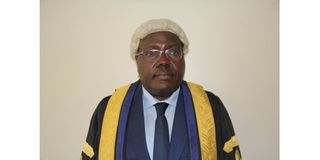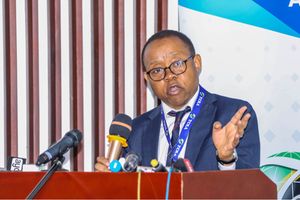French takes root in EAC after DR Congo entry

The newly elected speaker of the East African Legislative Assembly (Eala), Joseph Ntakarutimana, read part of his acceptance speech on Tuesday in French. PHOTO | COURTESY
What you need to know:
- Out of about 434 million people throughout the world who speak French, 77 million are in the DR Congo
Arusha. It is not merely an official language on paper, but French, rather than Kiswahili, is rapidly establishing roots in the East African Community (EAC) corridors.
Key officials of the regional organisation, especially those from DR Congo and Burundi, appear to spearhead the process.
Newly elected Speaker of the East African Legislative Assembly (Eala) Joseph Ntakarutimana read part of his acceptance speech on Tuesday in French.
The soft spoken former diplomat had started his speech in English, until recently the only official language of the Community.
However, before he ended, he repeated part of what he spoke in English in French, also the official language in his country.
But it was during the swearing in of the new lawmakers on Monday where newly picked MPs switched to French when taking oath.
This was more pronounced with the legislators from the giant DR Congo, which has the largest French-speaking community in the world.
Out of about 434 million people throughout the world who speak French, 77 million are in the DR Congo. France ranks second.
Even as they read various EAC documents- almost 100 percent English - the DRC, Burundi and Rwanda officials - would be seen communicating in French.
The three countries, the bedrock of the Great Lakes region, had French as the official language for decades, although Rwanda is increasingly becoming Anglophone.
French was also largely used in a series of speeches made during the gala dinner after the swearing in of the 63 MPs from all the partner states.
There was a high presence of officials from DR Congo, which joined the EAC in March this year, as the seventh member of the bloc at the event.
Regional observers see the development as an indicator of how the EAC was increasingly becoming diverse in many facets. While three of its partner states - DRC, Burundi and Rwanda - are largely Francophone, Kenya, Uganda and Tanzania remain Anglophone, English being a key official language.
South Sudan has two official languages; Arabic and English, all linked to the country’s long domination by Khartoum and the ensuing liberation struggle.
In between there is Kiswahili, the lingua franca; community-wide language in the region, according to the EAC Treaty.
Alongside French, Kiswahili was early this year declared additional official languages of the bloc alongside English.
Kiswahili is the national language of both Tanzania and Kenya and widely spoken in the rest of the partner states, except South Sudan.
Although recognised as the region’s lingua franca for years, Kiswahili is likely to be overtaken by French in official communication within EAC and its organs and institutions.
The French government recently pledged to support the EAC in the promotion of the French language, including meeting the cost of purchasing interpretation and translation equipment.
The French Embassy in Tanzania, also accredited to the EAC, was recently tasked to undertake a cost implications study on the adoption of French as one of the official languages of the bloc.
The study would cost 42,511 Euros. The exercise would start soon as part of the French government contribution to the EAC integration effort.



